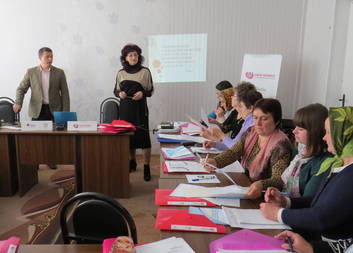Moldova, an Eastern European country, has been struggling with a shortage of social workers over the past twenty years. Few trained professionals alongside low salaries are much to blame for this. The number of people working in the country’s social sector in general is also critically low: 2,000.
A Moldovan association called HomeCare, together with Caritas Czech Republic, is trying to change the situation concerning provision of high-quality social services in Moldova. Under a joint three-year project, both organizations prepared trainings in homecare for 84 social workers.
Iula Bernic, the director of services of HomeCare in the Briceni area, said about the programme: “The ten-day training broadened my understanding of the possibilities of home care services. I also improved my teaching skills. Though there is a complex development of the legal framework, we – as social workers – still struggle with legal issues. Now I understand better how I should manage my work, how to communicate with social workers as well as with the needy or how to get volunteers working in home care. Simply put, I understand how to do my work better.”
Also, 200 social workers took a one-day training course organized by qualified experts of the Ministry of Labour, Social Protection and Family. Raisa Cazaretcaia, one of the participants, said, “If a person gets sick, people call a doctor. Many of the needy, however, are lonely persons with no relatives, yet they need constant care, communication and help with household chores. In rural areas, the life of dependent people is even harder. We are trying to help them as much as we can, but we lack necessary knowledge. That is the reason why I am grateful for the training. It gave me a lot of answers. Now I know how to convince people of home care’s worth.”
Even with similar successful efforts supported by Caritas CR and funded by the Czech Development Agency, it is necessary to further develop care services in Moldova. It is also necessary to renew respect for the elderly and abolish the assumption that the government and social workers can take care of all the needy without assistance.
For photographs from a training session in the village of Ocnita, see the gallery.







